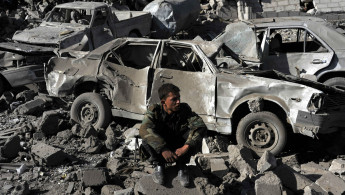Iran slams Saudi Arabia over Yemen airstrikes
Iran's foreign ministry was quick to oppose "aggressions in Yemen", saying the airstrikes had already led to the deaths of many innocent people.
"Saudi Arabia will be harmed by this war in the future," Iran warned the Gulf superpower.
Javad Zarif, Iran's foreign minister, is in Switzerland for talks on its nuclear programme with Saudi Arabia's ally, the United States.
"The military strikes mean an attack on Yemen's independence, and they will only cause more bloodshed," Zarif told al-Alam TV.
"Tehran is making an effort to solve the crisis there," he added.
Marzieh Afkham, an Iranian foreign ministry spokesperson, called for regional neighbours to "respect the sovereignty and independence of countries".
"Iran considers this a serious, uncalculated step, which is in violation of international laws and conventions," she said in a statement.
"The military airstrikes will complicate the situation in the region, give a boost to terrorism, and further complicate the Yemeni domestic situation."
Adel al-Jubeir, Saudi Arabia's ambassador to the US, announced in Washington that his country started an aerial assault on Houthi militants and remaining paramilitary groups loyal to former Yemeni President Ali Abdullah Saleh.
"[The operation] aims at defending the legitimate government" of the Riyadh-backed Yemeni President Abdrabbo Mansour Hadi.
| Riyadh launched a new war in the region, and it will be negatively affected by this war in the future. - Alaeddin Borojuerdi |
Saudi Arabia announced this morning that the first sorties in "Operation Decisive Storm" resulted in "the complete destruction of the air defences of the Houthis, the Daylami air base, SAM missile batteries, and four warplanes".
Alaeddin Borojuerdi, chairman of Iran's parliamentary national security committee said the action would come to haunt Saudi Arabia.
"Riyadh launched a new war in the region, and it will be negatively affected by this war in the future," he said.
Gulf rivalry
The Majles, Iran's parliamentary news service, cited Borojuerdi saying that "the US endorsement of such a move means Saudi Arabia and its allies received US permission before embarking on their military operation".
"Washington created crises in Iraq, Syria, and Afghanistan, and it continues to support other crimes in the region, something Iran strongly condemns," Borohuerdi was reported to say.
"[Iran calls for] an immediate halt to this operation and sitting at the negotiating table to find political solutions to what is happening in Yemen. Such a move will have serious consequences, the fires of which will reach numerous places in the region, which is already in a delicate situation."
Hossein Amir-Abdollahian, Iran's deputy foreign minister for Arab and African affairs, explained the Iranian stance on the Yemeni crisis in a meeting with Mikhail Bogdanov, Russian envoy to the Middle East.
Abdollahian said that the domestic situation in Yemen should be left to the representatives of the Yemeni parties to find a solution.
"Tehran and Moscow will stand united in the war against terrorism in the region," he said.
This article is an edited translation from our Arabic edition.



